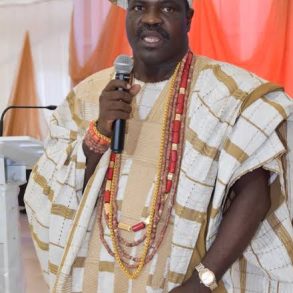By Adejumo David Adebayo
Undoubtedly, Yorùbá is the language that is most widely spoken in Southern Nigeria and throughout West Africa (separating West Africa from Sahel, even Core Northern Nigeria, i.e., North-West, Bornu, and Yobe, are considered Sahel).
There are various reasons why the number of Yorùbá speakers is rising; even those who may not be fluent or even comprehend the language would have said at least one word in it at some point, whether it was once a week, once a month, or once a year.
Let’s start with a brief overview of the language’s history in some earliest writings:
“Let me now refer briefly to the tribes that people this part of the world. First, we come to the Jakris, who are connected in race and language with the Yoruba people, extending from the Mahin country on the west to the Forcados on the East, and inland about as far as Sapele.”
Reference:
H. L. Gallwey, “Journeys in the Benin Country, West Africa,” The Geographical Journal, Vol. 1, No. 2 (Feb., 1893), p.127.
Yoruba was the Lingua Franca of most of southern Nigeria (Antonio brassio monumenta missionaria africana (1st series, 14 vols:lisbon, 1952-85, 8 no 135: Columbin de Nantes, Sao tome, 26 Dec 1940;)
In fact, by the time that the trade with Europe started, the Yorùbá language had become the lingua franca for peoples beyond the Yorùbá ethnic homeland.
Writing about the Aja kingdom of Allada; In 1668, Dapper said: “Their own mother tongue is by them little regarded; therefore, they seldom speak it; but they are obliged to speak mostly Alkomijs which in their country is regarded as a noble language.” One Father Columbin of Nantes visited the coast of West Africa as head of the French mission in 1634 and 1640. In a letter to the higher authorities of the mission, he wrote as follows about the Benin kingdom: In this kingdom, the people may very easily be led to embrace the faith, and priests can live here with greater ease than in other parts of Guinea because of the healthy climate … Their language is simple; it is called Licomin language and is universally used in these parts, just like Latin in Europe. Europeans along the West African coast called the Yorùbá- Lukumi, Lucumi or Alkomin (and endless variations of it) and the Yorùbá language Alkomijs, Licomin (and other variations). Thus, Dapper’s Alkomijs and Father Columbin’s Licomin meant the same — the Yorùbá language. The use of the Yorùbá language, therefore, linked together not only all parts of the Yorùbá homeland but also areas extending beyond. As earlier pointed out, the Aja country, commercially, was essentially part of western Yorùbáland. Such an expansive cultural and linguistic continuum provided great opportunities for commercial development.
The pan-African language of the twenty-first century, Yoruba, and its global reach
The widespread use of Yorùbá in Africa and throughout the world is influenced by a variety of reasons:
Yorùbá Spirituality- Ifá and Orisa spirituality
This is without a doubt the most widely practised and rapidly expanding African spirituality in both Africa and the rest of the globe. Apart from the impact of Hebrew, Greek, and Aramaic languages on Christianity and biblical books, Yorùbá is the liturgical language of Ifá and Orisa spirituality. It is comparable to how Arabic is to Islam, Hindi is to Hinduism, and even Latin is or was the language of the church. Yorùbá spirituality has derived traditions like Santera, an African diasporic religion that originated in Cuba in the late 19th century and is also known as Regla de Ocha, Regla Lucumí, or Lucumí. It was created as a result of a syncretic process involving the native Yorùbá spirituality of West Africa, the Catholic version of Christianity, and Spiritism and Candomblé, an African diasporic religion that emerged in Brazil during the 19th century. It developed as a result of a process of syncretism between a number of West African traditional spiritualities, primarily those of the Yorùbá, Bantu, and Gbe. Roman Catholicism’s version of Christianity has had some influence.
As a result, there is a good chance that at least one devotee will use Yorùbá during devotion or worship; at least one of them will use Yorùbá at some point during their lifespan.
Entertainment Industry
Popular music from West Africa and the diaspora that originated in Nigeria, Ghana, and the UK in the 2000s and 2010s is referred to as “afro-beats,” “Afro-pop,” or “Afro-fusion” under this general phrase. Yorùbá and Pidgin have long been considered the official languages of Afrobeats, with even non-Yorùbá Afrobeats singers using Yorùbá in their recordings. Despite not being of Yorùbá ancestry, musicians like Buju spoke about how they learnt the language and incorporated it into their music.
Due to the widespread popularity of afrobeats, it is very likely that non-Yorùbá people, such as members of other African ethnic groups, Asians, and Europeans, will come into contact with at least one Yorùbá word in their lifetime, even if they have never visited Nigeria, the Benin Republic, or Togo, home to the Yorùbá, or even know what the Yorùbá word(s) in the song lyrics mean.
Afrobeats uses a number of slang terms and street jargon with Yorùbá language roots.
Lagos State, which is the most populous and commercial state in Nigeria and is also a part of Yorubaland, greatly inspired Afro-beats, and Fela Anikulapo Kuti is regarded as the father of the genre.
Commerce and Trade
It goes without saying that Nigeria’s South-West geopolitical region serves as the nation’s industrial and commercial hub, and because of this, it sees a higher inflow of migrants than other areas. As a result, non-Yorùbá from other regions of Nigeria migrate mostly over land borders into the Lagos-Ogun-Ibadan-Abeokuta axis, as do non-Yorùbá from neighboring west African nations, particularly Benin Republic, Togo, and Ghana. They eventually master Yorùbá and can even speak it. Yorùbá speakers have expanded as a result, and non-ethnic Yorùbá speakers may now outnumber ethnic Yorùbá speakers in West Africa.
The employment of Yorùbá in science, technology, innovations, and other fields in our schools and institutions is something we look forward to, despite the fact that it isn’t the official language of Nigeria or even necessarily a language of education, science, and technology. This September, Amharic and Swahili language instruction will begin in Russian schools. Sputnik, a state-run news outlet and broadcast service in Russia, carried the announcement that Yorùbá would be taken into consideration.






